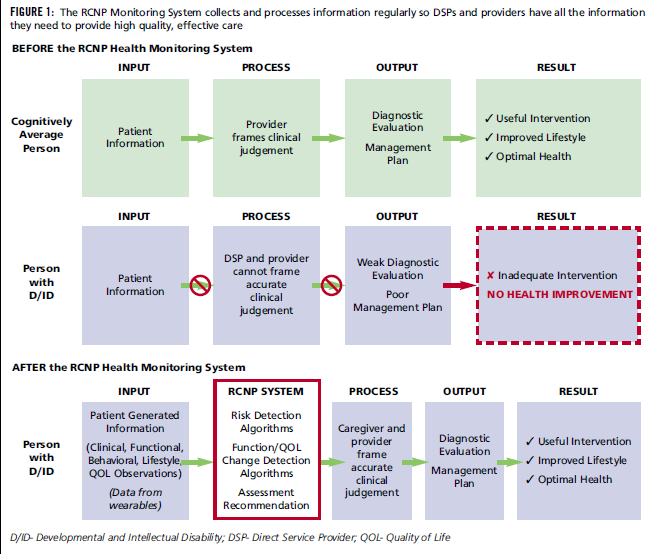SOLVING OLD HEALTHCARE PROBLEMS WITH NEW TECHNOLOGY
Most industries – from transportation to commerce – are now being revolutionized by advances in information technology. Hospital care is just beginning to leverage IT to do a better job for inpatients. Why not use these technologies to optimize the health of adults with IDD?
BY SUSAN ABEND, MD FACP
It can be very challenging to find good healthcare if you are an adult with an intellectual and developmental disability (IDD). In fact, many people stay with their pediatrician as long as they can because finding an adult doctor who is familiar with IDD is so difficult. While there are doctors and clinics that specialize in the care of adults with IDD, there are not very many. Unless you live nearby one and can wait for an appointment, they're not generally an option.

Most people need to rely on local primary care doctors for their health needs, yet many surveys have shown that the majority of doctors don't feel they have the training, information and skill to treat patients with IDD properly.
Why is this the case? There are many theories, and many barriers to good care have been identified. People with IDD are now living longer, and the general medical community has only recently come to realize that adults with IDD often have complex needs that require specialized knowledge. Unfortunately, a medical curriculum that teaches evidence-based practices is not yet widely available. To make matters worse, the average practitioner is under increasing time constraints and has often not been trained to work with someone who may have difficulty communicating his/her needs. It has also become harder to get the information needed to create a good care plan: staff members who accompany patients may not know them well, and may not have good training: In the U.S, direct service providers (DSPs) are experiencing a job vacancy rate of more than 9%, and the average support agency experiences a turnover rate of about 45% every year. It's a tremendous challenge to be sure that the people supporting adults with IDD know them well, can communicate properly with their providers, and are trained to recognize a change in health before a crisis develops. These obstacles to good care have had unacceptable consequences for those with IDD: Adults with IDD are more than twice as likely as average individuals to have unmet health needs. They receive fewer preventa tive health services, have more hospitalizations, are at higher risk of dying of illnesses like pneumonia, and have higher rates of diabetes, obesity and high cholesterol. These healthcare inequities are so great that the American Medical Association (AMA) and the American Academy of Developmental Medicine and Dentistry (AADMD) have advocated for legislation that persons with IDD be designated as a Medically Underserved Population.
However, a group of us who have worked to provide excellent, multispecialty care for adults with IDD have realized that if there are tools to help caregivers and practitioners overcome these communication and skill barriers, then all adults with IDD can get proper care from the provider of their choice. Armed with these tools, adults with IDD will no longer have to depend on a sys tem that may not meet their needs.
We realized that most industries – from transportation to commerce – are now being revolutionized by advances in information technology (IT). Hospital care is just beginning to leverage IT to do a better job for inpatients. Why not use these technologies to optimize the health of adults with IDD? We created a nonprofit organization to do just that: The Right Care Now Project (RCNP). With generous support from eClinicalWorks, one of the largest electronic health system companies in the U.S., our team – an internist, psychiatrist, neurologist, nurse, behaviorist and consumer, all with many years of experience and a deep understanding of healthcare for adults with IDD – has developed a system to help make sure that all adults with IDD can get expert care from all their providers.
You Can't Fix What You Can't Find
Caregivers and DSPs are exposed to a wealth of information every day that give clues about the health of adults who can't communicate directly. Currently, however, there's no consistent way to be sure each caregiver knows what information is important to record, to give to doctors at a visit, or to use to call for a doctor's attention. The backbone of the RCNP Health Monitoring System is a method for collecting, interpreting and distributing this important information – data that can be used by practitioners to figure out if a person has an active problem and/or needs an assessment to prevent a future problem or crisis. We created a computer cloud-based system where caregivers can log in to a website and work with the adult with IDD to easily answer specific questions about health, function, activities, quality of life, and their medical care. Caregivers can be trained to use the system in about an hour, and the questions take about 35 minutes to complete. The caregiver enters this information every three months, and this quarterly information is then automatically fed through algorithms, or short computer programs, that can pick up changes in health, or patterns that indicate that medical attention is necessary. The system can currently detect over 100 health issues that are common in those with IDD but are often overlooked or inadequately treated because providers don't have access to the information.
Nudging, Teaching and Tracking
The information in the system creates three important tools that alert caregivers and doctors that important medical attention is necessary, and what to do next. With these tools, people can get the care they need from a system that now can meet their needs. (see Figure 1).
1)The Health Risk Report: This is a notification generated after each quarterly data-entry session that gives the caregiver, DSP and/or guardian/advocate a list of potential health issues that need to be addressed. Each time the system flags a problem, that problem is listed on the person's report, along with recommendations for what the caregiver should do next, and how to alert the provider of the issue. Problems that appear in consecutive quarterly reports are flagged and sent to caregivers/DSPs as Risk Alerts. This tracking helps prevent issues from being ignored.
2)The Health Summary Passport: This report, accessible anytime, communi 2)The Health Summary Passport: This report, accessible anytime, communicates to doctors and other providers the important information necessary to give proper care. It includes specific descriptions of the person's baseline function, changes in function, new or ongoing physical or behavioral problems they may be experiencing, their health and medication history, and also includes recommendations for the provider to assess and manage the issues flagged by the system. For practitioners not familiar with the health issues common in people with IDD, it is a roadmap to guide proper assessment and referrals. For those providers who are skilled but need the important information that is often not available at the visit, the Health Summary Passport is an invaluable source of data to create a plan for evaluation and treatment.
3)The Quality Report: The Right Care Now Project Health Support System can also inform organizations who care for a group of people how well they are doing to make sure their clients have optimal care and health. It gives the organization information on over 40 indicators of good care and health. From the percentage of people who have gotten preventative care, to the percent with falls or pneumonia, the report can guide the organization to make sure they're doing everything to fix problems and prevent crises. It also allows them to identify the individuals affected by care issues, so they can perform direct supervision, to be sure all issues are addressed.
Because the RCNP system is built on eClinicalWorks electronic health record (EHR) technology, its information can be shared directly with EHRs used by each person's doctor. However, unlike a doctor's office EHR, which is controlled by providers and functions like a billboard, the RCNP system is interactive and prompts timely action. Guardians and advocates can also use the system to understand health issues that need attention and to help make sure that all health needs are addressed quickly and effectively.
We have designed the RCNP Health Monitoring System to empower adults with IDD to overcome the information and communication barriers that have long prevented them from getting the care they deserve. It is our hope that everyone will get the care they need from all their providers, regardless of their location or their ability to access a special clinic. No one should have to get care from their pediatrician well into adulthood, and all of us have a right to timely, effective healthcare. •
ABOUT THE AUTHOR:
Susan Abend, MD, FACP is the Chief Executive Officer of The Right Care Now Project. rightcarenowproject.org

The Right Care Now Project has been developed by physicians dedicated to making healthcare for adults with autism and intellectual disabilities accountable and effective. The Right Care Now Project is dedicated to assuring that all adults with autism or ID have access to appropriate, timely care. It does this by developing care standards and novel monitoring systems informed by its research, service and educational activities. rightcarenowproject.org